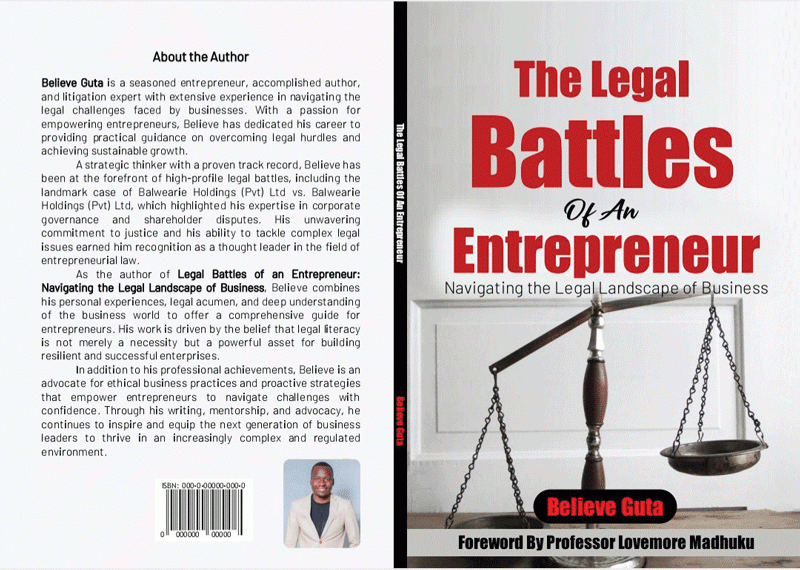
Title: Legal Battles of an Entrepreneur: Navigating the Legal Landscape of Business
Author: Believe Guta
Published in Harare by Big Brains Legal Aid Trust®, 2025, 100 pages
ISBN: 978-1-77934-430-4
Legal Battles of an Entrepreneur: Navigating the Legal Landscape of Business is a 10 Chapter book by Believe Guta.
It is pregnant with legal matters and is suitably created to prepare and guide new entrepreneurs and sharpen established business people to face and avoid weaknesses that may see them mired in litigation.
The guide is composed in simple language, it is easy to read and grounds entrepreneurs into legal literacy, opening doors into investment risk management, time wastage, and income losses caused by litigations of all sorts.
Guta’s legal matters made simple book, provides insights for the reader on what not to sleep on when starting or running an entrepreneurship, and what legal battles to fight. It also offers remedies for those battles. In this book, the author clearly shows that firms are legal entities separate from their founders and shareholders and can enter into contractual obligations administered by the law.
- Book review: Guta pens entrepreneurial legal toolkit
Keep Reading
As a result, legal conflicts are inevitable, but navigating them is a skill that should be learned in order to settle the legal conflicts amicably. It is on this basis that Guta, a legal strategist of note who has fought many such battles for self as a business person and representing companies that he is involved in has found it wise to pen this legal tool to address the possible legal challenges entrepreneurs encounter in their day to day running of their businesses.
Legal Battles of an Entrepreneur is a product of Guta’s experiential work that encompasses comprehensive lessons acquired over the length of his career and is created to guide entrepreneurs into overcoming encountered legal battles and prepare others for possible legal battles that they may face. It avails tried and tested strategies to use in effectively addressing challenges.
For instance, the book starts by addressing fundamental issues on why it is essential for entrepreneurs to have business legal literacy. It emphasizes that legal literacy equips entrepreneurs with the know how in order to secure their businesses from legal risks that may plunge their enterprises into turmoil and also aid them in ensuring compliance with rules and regulations and mitigate these risks. Guta warns:
Entrepreneurs often operate under the misconception that legal issues are secondary or can be dealt with later. However, proactive legal planning is critical at every stage of business—from incorporation and intellectual property protection to contract management and dispute resolution (p6).
Reading through the book aspiring and practising entrepreneurs are taken through a journey with many bends that may cause business fatalities, providing ways through which they can negotiate these legalscapes for their survival. For example, Guta warns entrepreneurs that though prioritizing financial, marketing, and operational strategies may be important to building a thriving entrepreneurship, building ‘a robust legal foundation’ is key to erecting a sustainable entrepreneurship. He infers the relevance of setting up legal strategies before founding an enterprise as failure to erect a sound legal entrepreneurship foundation leads to dissolution of businesses, loss of assets, and protracted legal battles. He advises that:
Entrepreneurs often operate under the misconception that legal issues are secondary or can be dealt with later. However, proactive legal planning is critical at every stage of business—from incorporation and intellectual property protection to contract management and dispute resolution.
Entrepreneurs need to believe in the power of legal literacy for them to acquire an understanding of the legal dimensions of entrepreneurship in order to protect their ventures, build resilience, and create a strong foundation for growth. Guta as a business person based in Kadoma has been involved in many battles and is using his vast knowledge in dealing with entrepreneurial litigations to help entrepreneurs in safeguarding their investment starting by encouraging them to legally secure their company names. He urges entrepreneurs to look beyond mere registering their names because a name is a battle to safeguard their identity, protect their market presence, and ensure their legal standing. The book is a result of Guta’s observation that many enterprises are found on the crossroads falling into costly, avoidable legal wrangles as presented as case studies in this toolkit.
Guta has used local and international case studies to illustrate the kinds of legal battles that some enterprises fought in the courts and won and others that some big Zimbabwean enterprises engaged in and lost all this to justify why this legal toolkit is of paramount importance to all forms of businesses.
The book also prepares entrepreneurs in protecting their company’s Intellectual Property (IP). Modern business space is flooded by imitators and identity thieves. Guta warns that businesses require legal literacy on how to protect their IP. He provides IP as a company’s trademarks, copyrights, patents, and trade secrets, which are valuable assets that define the company's competitive edge.
A company without an identity or that operates in the shadow of its competitors’ identity loses clientele confidence and its reputation. Guta advices such enterprises to always remember to renew their trademarks when their term expires. He says failure to do so may cause them to lose out to opportunists. A case study was provided where Lion Match Zimbabwe lost their trademark to Lion Match South Africa.
Reading this toolkit expands entrepreneurs’ knowledge in handling various legal matters such as boardroom battles where some shareholders or directors may intend to shoo away their fellow shareholders or directors. Such internal conflicts require wisdom in navigating, for they have the potential to “destabilise even the most promising ventures, creating challenges that threaten the stability, growth, and longevity of businesses,” Guta notes.
Every business survives from the suppliers who provide them with goods and services. There are possible contractual disputes emerging from entrepreneurs’ relationships with these third parties, such as vendors, clients, partners, and other stakeholders. Guta places third parties as the backbone of any business operations and mishandling the relationships results in shaky foundations. The toolkit thus provides the remedies used to avoid such drawbacks.
The book also discusses how best to deter employment battles. Workplaces conflicts are usually between employers and their employees. Uninspired workers are not motivated to excel, and this ends in bashing brands, destroying enterprises’ reputations. The author explores “employment laws, common workplace disputes, strategies for building a compliant workplace, and lessons learned from pivotal employment lawsuits that have shaped industry practices.”
Each possible legal challenge is tackled in its separate chapter, providing entrepreneurs with explicitly organised knowledge. For a business to maintain its continuity, it requires continuous cash flow from its debtors. Guta writes that debtors represent the financial backbone of sales and conflicts between debtors and entrepreneurs jeopardize a business’s stability. Strategies on effective debt collection and best practices for sustainable relationships with debtors are availed in this toolkit.
A business that engages in cat and rat battles with regulatory authorities is susceptible to folding, but those that comply avoid losing income as it is penalty free. Guta informs that compliance ensures;
that businesses operate within the law, maintain public trust, and protect their reputation. Compliance is not just about following rules; it’s about creating a solid foundation for sustainable growth. Regulatory challenges, if overlooked, can lead to crippling fines, lawsuits, or even business closure (p50).
This toolkit, if followed religiously by entrepreneurs, will aid them in keeping legal litigations away, thereby reducing wasting resources on legal battles. However, legal literacy requires preparation for legal battles no matter how well a business plans; they may just erupt unexpectedly, threatening its operations, finances, and reputation.
Furthermore, the book provides strategies for preparing for legal battles, including building a strong legal defence team, exploring dispute resolution options, managing costs, and learning valuable lessons from past experiences whether stemming from disputes with employees, customers, suppliers, or regulatory bodies.
Guta’s guide provides innovative ways of earning a good reputation, sound relationships and how to handle complex entrepreneurial legal disputations. It is a must-read for entrepreneurs.
The book will be launched in April the month of Zimbabwe’s national independence. Having it is synonymous with attaining entrepreneurial freedom.
About reviewer
Tinashe Muchuri is an author, field researcher, actor and a storyteller. He has over ten published fictional titles which are studied in the local education system. He is an expert in field work and that has taken him to Binga, Hwange, Chipinge, Bindura, Chivi and others, gathering and recording people’s stories on various social issues. He holds degrees in Media and Creative Writing. He is an award winning media writer in creative cultural industries. He has an interest in Social history, Human rights, and the indigenous knowledge systems. He has been invited to give presentations, stage performances in poetry and storytelling and readings in Zimbabwe and abroad. He is the founding member of the Zimbabwe Writers Association and its first Secretary General.
About author
Believe Guta is a seasoned entrepreneur, accomplished author, and litigation expert. He is the Director of Balwearie Holdings (Pvt) Ltd and the proprietor of Big Brains Legal Aid Trust. With extensive experience in corporate governance and legal strategy, he has played a key role in high-profile legal battles, including the landmark Balwearie Holdings (Pvt) Ltd v Balwearie Holdings (Pvt) Ltd case. A recognized thought leader in entrepreneurial law, he is also a past recipient of the Junior Citizen Award, courtesy of the Newsday Community Builders Awards. Through his writing, mentorship, and advocacy, he continues to inspire and empower the next generation of business leaders.










